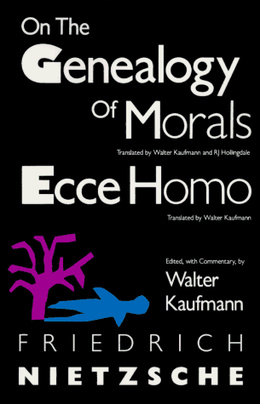Ecce homo: Wie man wird, was man ist, 1908. Recommended translations: On the Genealogy of Morals and Ecce Homo, trans. Walter Kaufmann, Vintage Books, 1969. Ecce Homo: How One Becomes what One Is, trans. R. J. Hollingdale, Penguin, 1982.
Excerpt:
The happiness of my existence, its unique character perhaps, lies in its fatefulness: expressing it in the form of a riddle, as my own father I am already dead, as my own mother I still live and, grow old. This double origin, taken as it were from the highest and lowest rungs of the ladder of life, at once a decadence and a beginning, this, if anything, explains that neutrality, that freedom from partisanship with regard to the general problem of life, which perhaps distinguishes me. I am more sensitive to the first indications of ascent and descent than any man that has yet lived. In this domain I am a master par excellence-I know both sides, for I am both sides. My father died in his thirty-sixth year: he was delicate, lovable, and morbid, like one fated for but a short life-a gracious reminder of life rather than life itself. In the same year that his life declined mine also declined: in my thirty-sixth year my vitality reached its lowest point-I still lived, but I could not see three paces before me. At that time-it was the year 1879-1 resigned my professorship at Base], lived through the summer like a shadow in St. Moritz, and spent the following winter, the most sunless of my life, like a shadow in Naumburg. I was then at my lowest ebb. The Wanderer and His Shadow was the product of this period. There is no doubt that I was familiar with shadows then. The following winter, my first winter in Genoa, brought with it that sweetness and spirituality which is almost inseparable from extreme poverty of blood and muscle, in the shape of The Dawn of Day. The perfect brightness and cheerfulness, the intellectual exuberance even, that this work reflects, coincide, in my case, not only with the most profound bodily weakness, but also with an excess of suffering. In the midst of the agony caused by a seventy-two hour headache and violent attacks of nausea, I was possessed of extraordinary dialectical clearness, and in utter cold blood I then thought out things, for which, in my more healthy moments, I am not enough of a climber, not subtle enough, not cold enough. My readers may know to what extent I consider dialectic a symptom of decadence, as, for example, in the most famous case of all-that of Socrates. All the morbid disturbances of the intellect, even that semi-stupor which follows fever, are to this day strangers to me; and to inform myself concerning their nature and frequency, I had to resort to learned works. My circulation is slow. No one has ever been able to detect fever in me. A doctor who treated me for some time as a nerve patient finally declared: “No! there’s nothing the matter with your nerves; I myself am the nervous one.” They have been unable to discover any local degeneration in me, or any organic stomach trouble, however much I may have suffered from profound weakness of the gastric system as the result of general exhaustion. Even my eye trouble, which at times approached dangerously near blinding, was only an effect and not a cause; for, with every improvement of my general bodily health came a corresponding increase in my power of vision. An all too long series of years meant recovery to me. But, sad to say, it also meant relapse, breakdown, periods of decadence. After this, need I say that I am experienced in questions of decadence? I know them inside and out. Even that filigree art of apprehension and comprehension in general, that feeling for nuances, that psychology of “seeing what is around the comer,” and whatever else I may be able to do, was first learnt then, and is the specific gift of that period during which everything in me was subtilized-observation itself, together with all the organs of observation. To view healthier concepts and values from the standpoint of the sick, and conversely to view the secret work of the instinct of decadence out of the abundance and self-confidence of a rich life-this has been my principal experience, what I have been longest trained in. If in anything at all, it was in this that I became a master. To-day my hand is skillful; it has the knack of reversing perspectives: the first reason perhaps why a Transvaluation of all Values has been possible to me alone.
Online:
Google Books (Recommended Translation)
Project Gutenberg (German, Free Access)
Amazon (Recommended Translation)
